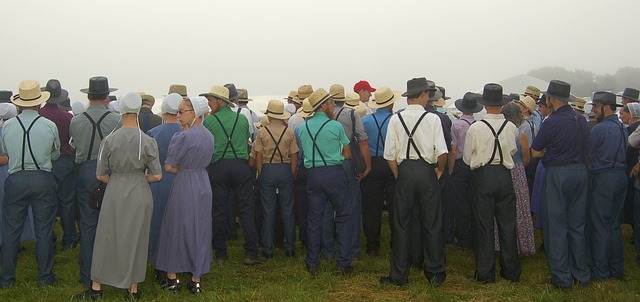Amish people do not have mustaches due to cultural and religious beliefs that prioritize simplicity, humility, and conformity to traditional norms.
Table of Contents
Cultural and Religious Beliefs of the Amish Community
Have you ever noticed that Amish men don’t have mustaches? It’s a curious observation that many people have made, and it’s not just a coincidence. The absence of mustaches among the Amish community is actually rooted in their cultural and religious beliefs. Let’s take a closer look at why this is the case.
The Amish community is known for its strict adherence to traditional values and a simple way of life. They believe in living a life that is separate from the modern world, and this includes their appearance. For the Amish, physical appearance is seen as a reflection of their commitment to their faith and their community.
One of the reasons why Amish men do not have mustaches is because facial hair is associated with vanity and pride. The Amish believe that excessive grooming and attention to one’s appearance can lead to a focus on the self, which goes against their core values of humility and modesty. By not having mustaches, Amish men are able to avoid the temptation of vanity and maintain a humble appearance.
Another reason for the absence of mustaches among the Amish is the influence of historical traditions. The Amish trace their roots back to the Anabaptist movement in 16th-century Europe, where the wearing of mustaches was associated with the military. The Amish, who are pacifists, wanted to distance themselves from anything that could be seen as militaristic or violent. As a result, they adopted a clean-shaven look, which has been passed down through the generations.
In addition to these cultural and historical reasons, the absence of mustaches among the Amish can also be attributed to practicality. The Amish lead a simple and labor-intensive lifestyle, often working in agriculture or other physically demanding occupations. Having a mustache can be cumbersome and get in the way of their work. By keeping their faces clean-shaven, Amish men are able to work more efficiently and comfortably.
It’s important to note that not all Amish communities have the same beliefs when it comes to facial hair. Some Amish groups do allow their men to have mustaches, while others may have different rules regarding facial hair. However, the majority of Amish communities do adhere to the tradition of not having mustaches.
In conclusion, the absence of mustaches among the Amish community is not a random occurrence. It is deeply rooted in their cultural and religious beliefs. By not having mustaches, Amish men are able to demonstrate their commitment to humility, modesty, and a simple way of life. It is just one of the many ways in which the Amish community sets itself apart from the modern world and maintains its unique identity. So, the next time you see an Amish man without a mustache, you’ll know that there is a deeper meaning behind it.
Historical Origins and Traditions of Facial Hair among the Amish

Have you ever noticed that Amish men don’t have mustaches? It’s a curious observation that has puzzled many people. To understand why this is the case, we need to delve into the historical origins and traditions of facial hair among the Amish.
The Amish are a religious group known for their simple way of life and adherence to traditional values. They believe in living a life separate from the modern world, and this extends to their appearance as well. Facial hair plays a significant role in Amish culture, and it is seen as a symbol of masculinity and maturity.
In Amish communities, growing a beard is a rite of passage for men. It signifies their transition from adolescence to adulthood and is considered a sign of wisdom and authority. However, the same cannot be said for mustaches. The reason behind this lies in the historical context of facial hair fashion.
During the 19th century, mustaches were associated with the military and the upper class. It was a popular trend among European aristocrats and officers, who often sported elaborate mustaches as a symbol of their status and power. However, the Amish, who value simplicity and humility, rejected this fashion trend.
The Amish believe in living a life of humility and modesty, and they view excessive grooming and attention to personal appearance as a form of vanity. For this reason, they choose to abstain from growing mustaches, as they are seen as a form of self-indulgence and pride.
Another factor that contributes to the absence of mustaches among the Amish is their desire to maintain a distinct identity. The Amish strive to separate themselves from the outside world and its influences. By not growing mustaches, they are able to distinguish themselves from other groups and maintain their unique cultural identity.
Furthermore, the Amish place a strong emphasis on community and conformity. They believe in living a life that is in harmony with their fellow believers, and this extends to their appearance as well. By adhering to a common standard of grooming, they foster a sense of unity and solidarity within their communities.
It’s important to note that not all Amish communities have the same rules regarding facial hair. Some Amish groups allow their men to grow mustaches, while others do not. These variations are often influenced by regional customs and individual church regulations.
In conclusion, the absence of mustaches among the Amish can be attributed to their historical origins and traditions. Facial hair, particularly beards, holds great significance in Amish culture, symbolizing maturity and authority. The rejection of mustaches stems from a desire to maintain simplicity, humility, and a distinct cultural identity. By adhering to these traditions, the Amish are able to live a life that is in harmony with their beliefs and values. So, the next time you come across an Amish man without a mustache, you’ll know that it’s not just a matter of personal preference, but a reflection of their deeply rooted cultural and religious beliefs.
Symbolism and Significance of a Clean-Shaven Face in Amish Culture
Have you ever noticed that Amish men don’t have mustaches? It’s a distinctive feature of their appearance that sets them apart from the rest of society. But have you ever wondered why this is the case? In Amish culture, a clean-shaven face holds a deep symbolism and significance that goes beyond mere fashion choices.
To understand the reason behind this unique tradition, we need to delve into the core values and beliefs of the Amish community. The Amish are a group of traditionalist Christian church fellowships who prioritize simplicity, humility, and separation from the modern world. They strive to live a life that is in harmony with their religious beliefs and reject many aspects of modern society, including technology and fashion trends.
For the Amish, a clean-shaven face represents humility and simplicity. They believe that excessive grooming and attention to physical appearance can lead to vanity and pride, which are considered sinful. By abstaining from growing mustaches, they demonstrate their commitment to a modest and unassuming lifestyle. It is a way for them to show that they are not concerned with worldly appearances but rather focus on their spiritual journey.
Furthermore, the absence of mustaches in Amish culture also serves as a symbol of unity and conformity within the community. The Amish value community over individuality and strive to maintain a sense of togetherness. By adhering to the same grooming practices, they create a sense of uniformity and solidarity among themselves. This shared appearance helps to reinforce their collective identity and reinforces their commitment to their faith and way of life.
In addition to the symbolic significance, the absence of mustaches in Amish culture also has practical reasons. The Amish lead a predominantly agrarian lifestyle, with farming being a central part of their community. Mustaches can be a hindrance when working with machinery or animals, as they can get caught or become a safety hazard. By keeping their faces clean-shaven, the Amish ensure that they can work efficiently and safely without any unnecessary risks.
It’s important to note that not all Amish groups have the same grooming practices. Different communities may have variations in their interpretation of the rules and traditions. Some Amish men may choose to grow beards while keeping their mustaches shaved, while others may opt for a completely clean-shaven look. These variations are influenced by factors such as regional customs and individual preferences within the community.
In conclusion, the absence of mustaches in Amish culture holds deep symbolism and significance. It represents humility, simplicity, and a rejection of worldly appearances. It also fosters a sense of unity and conformity within the community. While practical reasons also play a role, the primary motivation behind this tradition is rooted in their religious beliefs and commitment to their way of life. So, the next time you see an Amish man without a mustache, remember that there is much more to it than meets the eye.
Practical Reasons for the Absence of Mustaches among the Amish
Have you ever noticed that Amish men don’t have mustaches? It’s a curious observation, and you might wonder why this is the case. Well, there are actually practical reasons behind the absence of mustaches among the Amish community.
One of the main reasons is that the Amish value simplicity and modesty in their appearance. They believe that excessive grooming and adornment can lead to vanity and pride, which goes against their core values. By not having mustaches, they avoid drawing attention to themselves and maintain a humble appearance.
Another practical reason is that having a mustache can be seen as a symbol of authority or power in some cultures. The Amish, however, strive for equality and reject any form of hierarchy or dominance. By not having mustaches, they promote a sense of unity and equality among their community members.
Additionally, the Amish lifestyle is centered around manual labor and physical work. They engage in farming, carpentry, and other trades that require them to work with their hands. Having a mustache can sometimes interfere with their work, especially when it comes to tasks that involve handling tools or machinery. It can get in the way or become a safety hazard. By not having mustaches, they ensure that their work is not hindered and that they can perform their tasks efficiently.
Furthermore, the absence of mustaches among the Amish can also be attributed to their desire to differentiate themselves from the outside world. The Amish strive to live a separate and distinct lifestyle, one that is separate from modern society. By not having mustaches, they set themselves apart and maintain their unique identity.
It’s important to note that not all Amish communities have the same practices when it comes to facial hair. Some Amish groups allow their men to grow beards but not mustaches, while others may allow both. These variations can be influenced by regional customs or individual interpretations of their religious beliefs.
In conclusion, the absence of mustaches among the Amish can be attributed to practical reasons such as simplicity, modesty, equality, and the nature of their work. By not having mustaches, they uphold their values and maintain a distinct identity within their community. So, the next time you see an Amish man without a mustache, you’ll know that there’s more to it than meets the eye.
Conclusion
The Amish people do not have mustaches due to their religious beliefs and cultural traditions.
For licensing reasons, we must provide the following notice: This content was created in part with the help of an AI.


